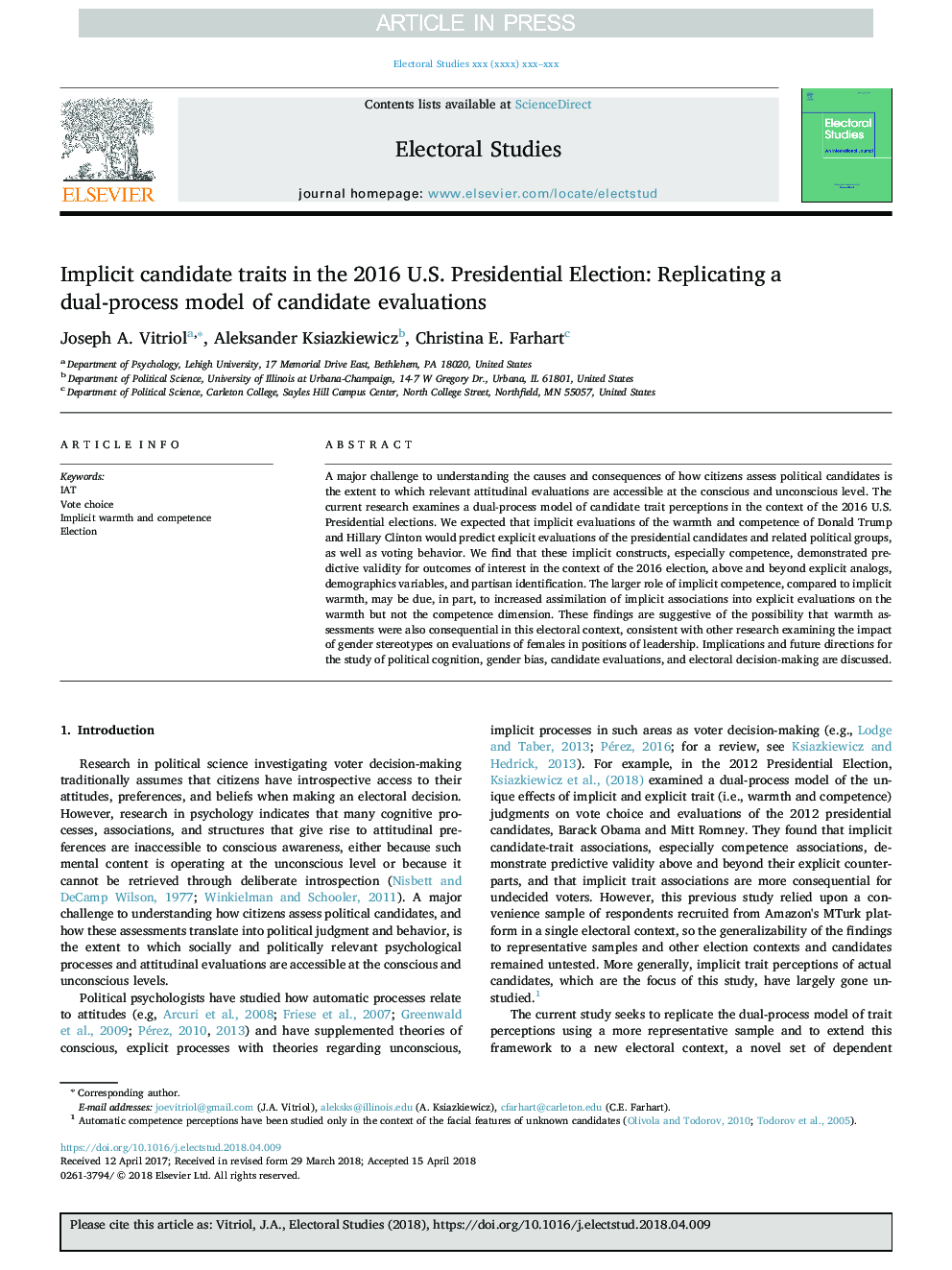| کد مقاله | کد نشریه | سال انتشار | مقاله انگلیسی | نسخه تمام متن |
|---|---|---|---|---|
| 7463139 | 1484939 | 2018 | 8 صفحه PDF | دانلود رایگان |
عنوان انگلیسی مقاله ISI
Implicit candidate traits in the 2016 U.S. Presidential Election: Replicating a dual-process model of candidate evaluations
ترجمه فارسی عنوان
ویژگی های نامطلوب نامتجانس در انتخابات ریاست جمهوری ایالات متحده در سال 2016: تکرار یک مدل دو مرحلهای ارزیابی کاندیداها
دانلود مقاله + سفارش ترجمه
دانلود مقاله ISI انگلیسی
رایگان برای ایرانیان
ترجمه چکیده
یک چالش عمده برای درک علل و پیامدهای چگونگی ارزیابی شهروندان از نامزدهای سیاسی، میزان سنجش نگرش مربوطه در سطح آگاهانه و ناخودآگاه است. تحقیقات کنونی یک مدل دو مرحلهای از ادراک ویژگیهای کاندید را در چارچوب انتخابات ریاست جمهوری سال 2016 ایالات متحده بررسی میکند. ما انتظار داشتیم که ارزیابی های ضمنی از گرما و صلاحیت دونالد تامپ و هیلاری کلینتون ارزیابی صریح از نامزدهای ریاست جمهوری و گروه های سیاسی مرتبط و همچنین رفتار رای دهی را پیش بینی کنند. ما دریافتیم که این ساختارهای ضمنی، به ویژه صلاحیت، اعتبار پیش بینی شده را برای نتایج منافع در زمینه انتخابات 2016، بالاتر و بالاتر از آنالوگهای صریح، متغیرهای جمعیت شناختی و شناسایی حزب نشان داد. نقش بزرگتری از شایستگی ضمنی در مقایسه با گرمای ضمنی، شاید بخشی از آن است که بخشی از افزایش وابستگی ترکیبات ضمنی به ارزیابی صریح گرما، اما نه ابعاد شایستگی است. این یافته ها نشان می دهد که احتمال ارزیابی گرما نیز در این زمینه انتخاباتی مطرح شده است، که مطابق با تحقیقات دیگر بررسی تاثیر کلیشه های جنسیتی بر ارزیابی زنان در موقعیت های رهبری است. پیامدهای و جهت گیری های آینده برای مطالعه شناخت سیاسی، تعصب جنسیتی، ارزیابی نامزدها و تصمیم گیری های انتخاباتی مورد بحث قرار گرفته است.
موضوعات مرتبط
علوم انسانی و اجتماعی
علوم اجتماعی
جغرافیا، برنامه ریزی و توسعه
چکیده انگلیسی
A major challenge to understanding the causes and consequences of how citizens assess political candidates is the extent to which relevant attitudinal evaluations are accessible at the conscious and unconscious level. The current research examines a dual-process model of candidate trait perceptions in the context of the 2016 U.S. Presidential elections. We expected that implicit evaluations of the warmth and competence of Donald Trump and Hillary Clinton would predict explicit evaluations of the presidential candidates and related political groups, as well as voting behavior. We find that these implicit constructs, especially competence, demonstrated predictive validity for outcomes of interest in the context of the 2016 election, above and beyond explicit analogs, demographics variables, and partisan identification. The larger role of implicit competence, compared to implicit warmth, may be due, in part, to increased assimilation of implicit associations into explicit evaluations on the warmth but not the competence dimension. These findings are suggestive of the possibility that warmth assessments were also consequential in this electoral context, consistent with other research examining the impact of gender stereotypes on evaluations of females in positions of leadership. Implications and future directions for the study of political cognition, gender bias, candidate evaluations, and electoral decision-making are discussed.
ناشر
Database: Elsevier - ScienceDirect (ساینس دایرکت)
Journal: Electoral Studies - Volume 54, August 2018, Pages 261-268
Journal: Electoral Studies - Volume 54, August 2018, Pages 261-268
نویسندگان
Joseph A. Vitriol, Aleksander Ksiazkiewicz, Christina E. Farhart,
